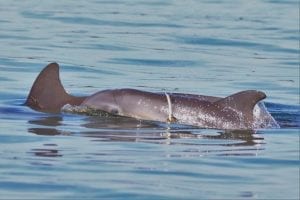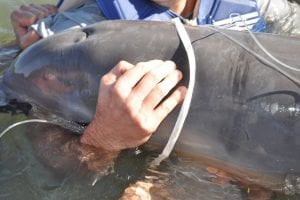Johns Pass, FL (October 2015) – Rescue personnel originally received a call from a local boat captain reporting a bottlenose dolphin calf entangled in plastic wrapping on October 6, 2015. The white plastic strap was observed encompassing the anterior portion of the animal’s body between the pectoral flippers and dorsal fin, constricting growth of the developing calf. The constriction posed a life threatening situation in need of removal, which required human intervention.

Coordinated Rescue Response
The National Marine Fisheries Services coordinated the multi-agency response. Collaboration included biologists and veterinarians from Clearwater Marine Aquarium, the Sarasota Dolphin Research Project, Mote Marine Laboratory, the Florida Fish and Wildlife Conservation Commission, the University of Florida, and SeaWorld Orlando. On the morning of October 15th, a team of 37 rescue personnel from various agencies were deployed in efforts to disentangle the calf. Upon capture, approximately five feet of fishing line was observed trailing the plastic material wrapped around the calf’s body. The calf was successfully disentangled, and upon examination no major injuries were noted. A roto tag was applied to the dorsal fin to aid in monitoring efforts and the calf was released with the mother. To ensure the pair continued to thrive in their natural environment, monitoring efforts proceeded for a period of several weeks. Today, Parcel and her mother are still observed in the area, including Clearwater Bay.

Learning from This Rescue Story
When is human intervention necessary?
Human intervention of free swimming cetaceans is taken only under absolute necessity. Evaluations by NOAA Fisheries Service, together with the Wildlife Branch of the Unified Command, determines whether intervention is necessary for wild dolphins in distress. Monitoring is conducted to assess the animal’s estimated age/size, body condition, and behavior. Veterinarians and marine mammal experts are consulted to determine the best course of action, and to determine whether the animal is unlikely to survive because of debilitation. Trained personnel from marine mammal stranding networks are constantly on stand-by if intervention is necessary. If you discover a marine mammal in distress, please contact your local stranding team immediately or call the Wildlife Hotline at 1-866-557-1401.
How does human interaction affect free-swimming dolphins?
Human induced injuries and fatalities have continued to increase due to the rise of human activity along the coast. Various forms of human interaction include vessel strikes, as well as fisheries interactions involving ingestion and entanglement. However, there are several ways you can help! By simply disposing of trash on the beach or using precautionary measures when boating, you can assist in the prevention of human interaction affecting wild dolphins.